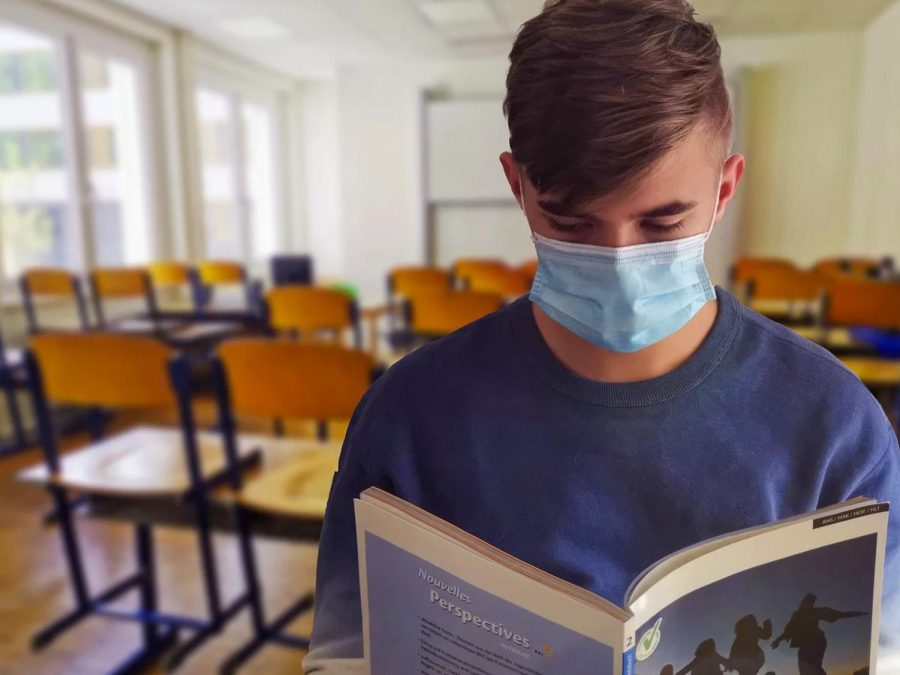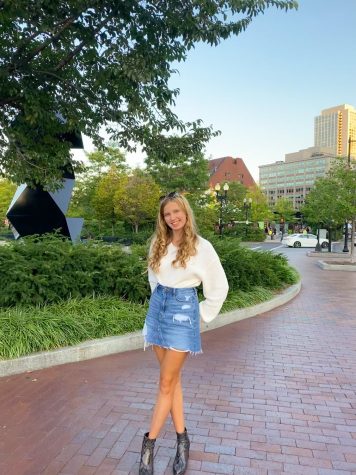“Blue’s Clues” teaching: the challenges of adapting subjects to COVID-era education
Photo courtsey of Alexandra Koch / Creative Commons / Pixabay
A masked student reads a book in an empty classroom. Scotch Plains-Fanwood Public Schools reopened for HS students on Jan. 19, 2021; many students now attend socially-distant, masked classes.
April 6, 2021
When Terrill Middle School band teacher Trey Shore got into teaching, he didn’t think he was signing a contract to be the host of his very own Nickelodeon Jr. television show.
“I like to think of it like I’m Steve from ‘Blue’s Clues’ or I’m Dora the Explorer because I’ll play my instrument and they’ll all be at home playing their instruments too, except they’re all muted. So I’m like, Alright let’s play measure one through five!’” Shore said (as he mimed his saxophone and hummed a chromatic scale). “‘Good work!’” he said with true ‘Blue’s Clues’ enthusiasm.
In Middle School Band, Shore’s students participate in breakout lessons, where they leave their academic class to meet with Shore and fellow musicians to practice their instruments. In these lessons, where Shore meets with between five and 10 students, Shore has each student unmute to play a section of a song – these are the sole moments during which he has gotten to hear his students play live since March 2020.
With hybrid instruction, Shore’s Nick Jr. “full band,” show is canceled for all but the 15 minutes at the end of the school day when all of his students are remote, during which he gets the students playing as quickly as he can. When he has some students in the classroom, he leads discussions about music theory or will show a performance and ask students their thoughts about it. Occasionally, the students at home will play through a song and the students in the building will clap out the rhythms to their parts.
“I don’t know if this is good teacher advice but this is something that I kind of just instinctively do and almost involuntarily do: whenever there’s an opportunity, within reason, for me to find a joke or find a laugh or find some way for us all to laugh together, even if it’s at me,” Shore paused, “Especially if it’s at me, you know, I’ll seize that…. It’s the smallest answer but also the most foundational sort of answer is that you know you got to find whatever moment you can to laugh.”
Scotch Plains-Fanwood High School’s Michael Abadir is no stranger to getting students to laugh.
Abadir teaches Chemistry at both the accelerated and AP levels at SPFHS, a class that relies heavily on hands-on lab experiences. Although much of Abadir’s energy has been dedicated to adapting these labs for the screen, his favorite moments of the day are the first five minutes of each class period, which he uses to spark short conversations with his students.
“I make it a point in the first couple minutes of class to have a conversation to have kids talk, and for me to talk – just to be a real person,” Abadir said. “Talk about, you know, skiing or breakfast or anything, but not dive right into the lesson because I really believe that the most effective learning you can have is when you have a good connection with the person from whom you’re learning. And so when you have that established foundation of a relationship it really helps to make everything else follow through.”
Especially given the challenging circumstances of this year, Abadir has made a conscious effort to convey optimism to his students, in the hopes to brighten their days, even slightly.
“It’s so easy in life to find something to complain about – everybody could find something to complain about in their lives,” Abadir said.”But that’s not the way to go because you can’t live like that; you just have to be positive and make the best out of everything and hopefully that is contagious to everybody else.”
Pre-pandemic, Abadir employed the “flipped classroom,” model, in which students take part in video lectures for homework, coming in with notes from the lectures, to allow for more time in class to ask meaningful questions, complete practice problems, and most notably, do labs. Having these videos in his arsenal, Abadir said, made adapting to online/hybrid teaching a smidge easier. His greatest challenge, though, has been finding unique ways to adapt his signature labs.
Abadir spends time each week making new videos outlining lab procedures; he’ll do a lab in his classroom and record it so students can see the procedure, get Abadir’s commentary, and have data to base their work on. Abadir also uses a platform called Gizmos, on which students can do virtual experiments. He even organized a take-home pH lab where students could test various household objects for how acidic or basic they are. Abadir believes that having an understanding of the concrete applications of the abstract concepts he discusses with his students not only bolsters their understanding, but it’s what makes Chemistry fun.
“[Abadir is] innovative,” junior Amelia Sherman, one of Abadir’s AP Chemistry students, said. “He’s always got new ways to change things up and get us a better understanding of the unit. All of the labs are good in their own ways, and I like that we can experience all of the different types of labs.”
Despite the increased technological challenges of hybrid learning, Abadir found immense joy in seeing students in his classroom.
“It was almost like a breath of fresh air, for lack of a better word,” Abadir said. “I still had to wrap my head around the fact that that was the first time that students were sitting in my room since last March, almost a year later…. That first day, you just had to just enjoy and experience that conversation and the first maybe seven minutes instead of five minutes just to kind of like soak that in.”
“[We’re] moving towards hope,” Shore said. “You know it’s a lot of keeping our heads down – we’re kind of in the muck right now, but we are working towards more. We are moving towards more hopeful times just by the virtue of moving forward in time. And, you know, it’s almost a conscious effort sometimes… to move towards hope, but we can.”



